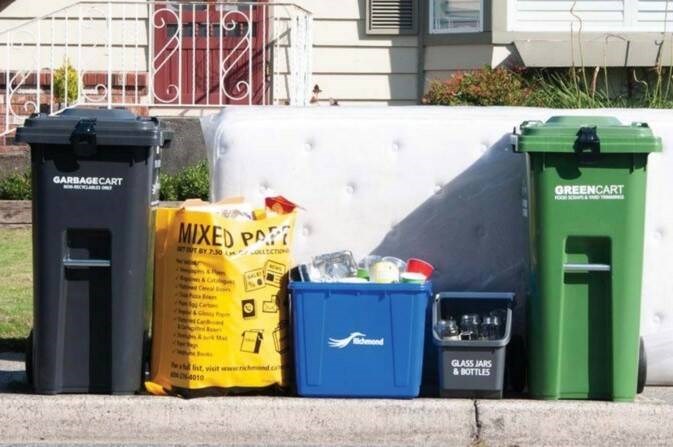Some Richmond business owners are frustrated with unauthorized garbage dumped into their bins, creating health hazards and harming the environment.
Sometimes, commercial recycling and garbage bins in the area are forcibly opened and used by unauthorized users, explained Terina Nowe, manager of Vancouver Lighting that has been on Bridgeport Road for more than 30 years.
“They cracked the lock open and dumped their garbage, paints… into our bin. They really abuse the law,” Nowe told the Richmond News.
“Firstly, it takes up the space so we don’t have enough room in the bin. Secondly, it creates a mess and poses safety issues. Some of the items are toxic things and pose health hazards to our staff. And these things should be recycled differently – it’s not good for the environment.”
Nowe, who does recycle, said she wishes every business owner would follow the rules and do their part in recycling.
According to data provided by Metro Vancouver, the commercial recycling rate in the region was only 46 per cent in 2021, much lower than the overall recycling rate of 65 per cent, which takes into account residential homes.
In fact, according to the city, Richmond residents divert 79 per cent of their waste from the landfill.
The city notes in its report to council illegal dumping is among the top concerns identified by city staff, followed by the cost and space required for additional bins and the inconsistency of recycling programs between residential and commercial properties.
More enforcement, incentives may help
Judi Merrell, supervisor at TileTown, a long-time tile business in northeast Richmond, said it’s sad some businesses are not following the recycling rules.
“Some people dump hazardous things into sewage, killing the fish and damaging the grass. Animals can get sick after eating the grass,” said Merrell.
“We talk about building the Massey Bridge to get us to Delta faster. If we don’t even protect this island, never mind going across the river.”
She said more enforcement may be needed to ensure businesses actually follow the rules. Fines could be issued to businesses that don’t recycle properly, or if recycling is not done properly, a garbage truck could refuse to pick up the bin.
Merrel said businesses react to incentives so the city could think about offering incentives to businesses that do recycle. The city could also provide education, through an app for instance, to businesses and students who may become the next generation of business owners.
To increase Richmond’s commercial recycling rate, city council recently approved a Business Education and Advisory Program, which will include a business education toolkit and a communication campaign to raise awareness in the business community about recycling issues.
There are some recycling initiatives available for businesses in Richmond, for example, businesses are allowed to drop off up to one cubic yard of acceptable recyclables for free at the city works yard on Lynas Lane. This excludes yard trimmings and upholstered furniture which require fees.
Got an opinion on this story or any others in Richmond? Email your thoughts or story tips to [email protected].



